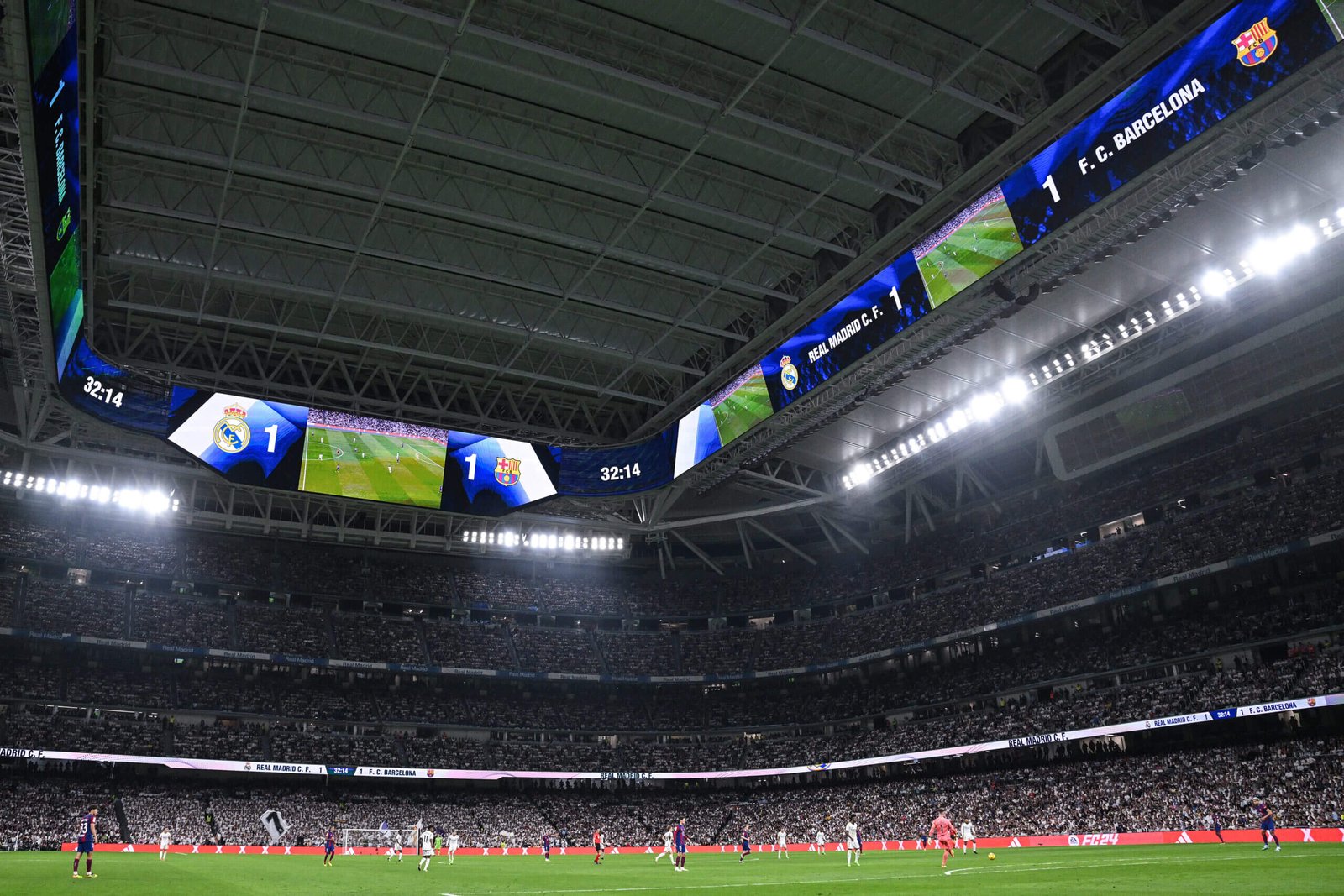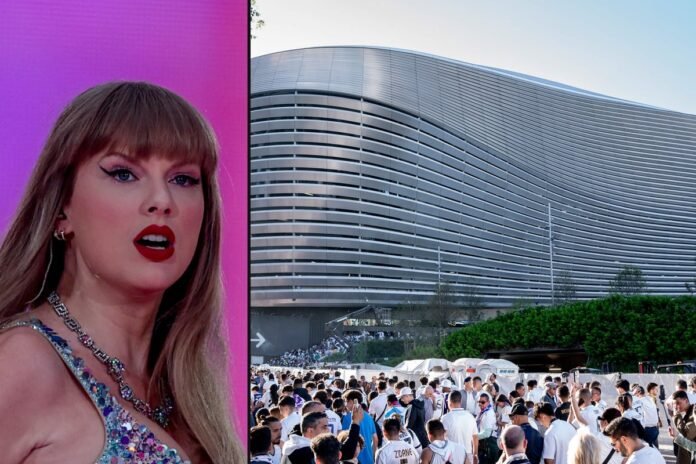“We’re like a tiny ant in all this,” says Jose Manuel Paredes. “You have Real Madrid, the Estadio Santiago Bernabeu, Madrid town hall, U.S. company Legends and Sixth Street, an investment fund worth billions of dollars.”
Paredes is the spokesperson for the Asociacion de Perjudicados por el Bernabeu (Association of people impacted by the Bernabeu), a group of concerned residents that has succeeded in getting Real Madrid to postpone a series of concerts programmed for the Bernabeu stadium.
“It seems nobody realised that noise from the concerts would be above the legal limit,” Paredes tells The Athletic. “Or thought whether they had the proper licences or not. Or of the effect it would have on the neighbourhood. We’re doing what we can to defend our families, defend our community.”
Taylor Swift, Mexican singer Luis Miguel and Colombian reggaeton artist Karol G are among the global stars to have performed at the Bernabeu this summer.
Madrid’s ground has been redeveloped at a cost of more than €1billion ($1.1bn; £843million at current exchange rates). The upgrades include a new roof and a retractable pitch to allow the stadium to be used for concerts and other events to generate off-pitch revenue, helping to fund the project.
But last Friday, Madrid announced a decision to “provisionally reprogramme” their “agenda of events and concerts at the Estadio Santiago Bernabeu”. It was a huge victory for residents of the neighbourhood around the ground, who have rallied against the noise and disruption caused.
The K-pop event Music Bank, set for October 12, has been cancelled. Concerts of Spanish artists Dellafuente, Aitana and Lola Indigo that were supposed to take place in November, December and March 2025 respectively have been postponed. The statement said new dates for each act would be “announced soon”.
Fans at a Bernabeu concert this month (Ricardo Rubio/Europa Press via Getty Images)
The Bernabeu is located to the north of Madrid’s city centre, in a neighbourhood with a well-established residential, business and commercial mix.
“More than 20,000 people live in the area affected by the noise,” says Paredes. “Most of us in the association are either Madrid socios (club members) or fans, as I am.
“I live about 250 metres from the stadium, I can see it from my window. When there’s a game, you hear the club anthem, and then cheers when a goal is scored. And because it is Real Madrid, there are lots of goals. But that does not bother us; the concerts do.”
Putting a roof on the stadium was a long-held ambition of Madrid president Florentino Perez, who proposed the idea in his first term as president in the early 2000s.
In May 2022, Madrid announced a deal with U.S. investor Sixth Street and stadium-management specialist Legends to provide €360million in funding for the rebuild, in exchange for 30 per cent of the revenue from the stadium’s events for 20 years — with the exception of season ticket sales.

The revamped Bernabeu’s roof in action during Madrid’s April La Liga meeting with Barcelona (David Ramos/Getty Images)
The Bernabeu previously hosted occasional concerts, with acts including Frank Sinatra, The Rolling Stones and U2. But since early 2024 — with the stadium rebuild almost complete — regular concerts and events have taken place whenever there has been enough time between Madrid games.
Last season, the club hierarchy asked La Liga to move the final match of the season at home against Real Betis to facilitate a second Taylor Swift concert at the stadium in May. Concerts continued through the summer, with dates for Argentine rapper Duki, Spanish singer-songwriter Manuel Carrasco and four consecutive nights of Karol G.
“The worst was the four days of Karol G; it was terrible,” Paredes says. “Noise continued after midnight, there were refuse bins pushed over, glass doors broken on apartment buildings. People were urinating in doorways, vomiting too.
“This is a neighbourhood where many older people live, there’s a hospital and schools. For Taylor Swift, you needed to get a permit to enter the street to pick up your kids from the school right across the street from the Bernabeu.”
Affected residents mobilised against what they saw as unwarranted intrusions into their lives, with an account on X set up to post videos of the noise, as experienced by residents close to the stadium.
En estéreo, por si las dudas. #GolesSÍDecibeliosNO #StopConciertos pic.twitter.com/pBEKq3lz7i
— Ruido_Bernabeu (@RuidoBernabeu) September 7, 2024
Official complaints — including proof that legal noise levels were being surpassed — were made to the local police and other authorities. Madrid town hall reacted by fining the concert promoters and attempts were made to try to limit the noise.
Madrid’s statement on Friday said the decision to postpone the concerts was part of “a series of measures the club had been taking to ensure it complied strictly with the current municipal regulations.” These measures included “soundproofing” the stadium, but the club accepted it was “a great challenge” to comply with these regulations.
When the New York-born ‘King of Bachata’ (a genre of music and dance originally from the Dominican Republic) Romeo Santos played the Bernabeu on September 7 and 8, concert-goers complained they could not hear. Videos on social media showed Santos himself telling spectators that “the authorities are making us follow the rules”. Others showed the crowd chanting “We can’t hear,” then cheering when the volume was increased.
“The only real change was that the Romeo Santos concerts ended earlier, just after 11pm,” says Paredes. “But you could still hear a lot of the noise outside, and once again it was well over the legal limit. There were the same drunk people before and after the concert.
“It showed that, whatever measures you take, the stadium is just not prepared for hosting concerts. And we don’t believe it ever will be — it is an open stadium, and we think it is impossible to close it completely.”
In July, a legal complaint from the residents was accepted by a Spanish judge, who called a hearing for October 29, at which Real Madrid’s director general Jose Angel Sanchez has been called to give evidence.
“We believe in the justice system,” Paredes said. “We’ve proof that, (at) every concert until now, the noise has been above the legally acceptable level. We also asked for Madrid’s mayor (Jose Luis Martinez-Almeida) and the council’s delegate for urbanism, environment and mobility (Borja Carabante) to be included in the criminal complaint. The judge said no, and we have appealed that decision.
“The stadium only has a licence for sporting events. For each concert, they get an ‘extraordinary’ permit from the town hall. But when there are more than 20 concerts per year — (almost) more concerts than games of football — the extraordinary becomes the norm.”
Martinez-Almeida, of the conservative People’s Party (PP), has repeatedly downplayed the issue. After the most recent September concerts, he said “positive” action had been taken by the organisers and that there had not been “too many incidents” before or afterwards.
“Martinez-Almeida said the concerts were something very important for the city of Madrid, for its international image, for tourism,” Paredes says. “He said there were few problems, despite the complaints of the neighbours. But in the end, it was shown that we were right.”

Martinez-Almeida greets Perez at a Madrid match last season (Oscar J. Barroso/Europa Press via Getty Images)
After the concerts were postponed, the mayor said he “thanked Real Madrid for having taken a complicated and difficult decision from a financial and reputational point of view”. “The town hall has always been working to find the best solution possible,” he added.
On Saturday, the Spanish singer Aitana posted on Instagram to “confirm” new dates of June 27 and 28 for her Bernabeu concerts. Madrid’s statement did not mention these new dates, but it did say that they “will continue to work towards ensuring that during the concerts the precise conditions are met in the production and emission of sound that allow concerts to be held in our stadium”.
“In addition to concerts, the Bernabeu is prepared to host a large number of events and shows, which will continue to take place as part of the stadium development project,” the statement said.
“The business model — Real Madrid with Sixth Street and Legends — is under threat,” Paredes says. “They have to do as much as they can to get a return on their investment.
“Our fear is that Madrid want to win some time to be able to refit the stadium. If they try to get the licence changed so they can host concerts — not just football games — it would be a huge scandal. They want to turn the neighbourhood into a type of Real Madrid theme park. But this is a residential neighbourhood.”
There is a David versus Goliath feel to the residents’ struggles against Madrid, U.S. investors and the Spanish authorities. But they know a final victory will be difficult.
“Rather than celebrating, we are relieved,” says Paredes. “For at least six months, the neighbourhood will be a little quieter.
“We’ve thrown the first stone, and we have hit the giant. But now to see what happens next. We’re prepared to keep fighting.”
A previous version of this article said Madrid’s deal with Sixth Street and Legends was €360million in funding for 30 per cent of revenue from the Bernabeu’s non-sporting events for 20 years. The deal is for revenue relating to all stadium events for 20 years — with the exception of season ticket sales — and the article has been updated to reflect this.
(Top image: Taylor Swift performing at the Bernabeu in May, the stadium before April’s Clasico; Getty Images)
Read the full article here


